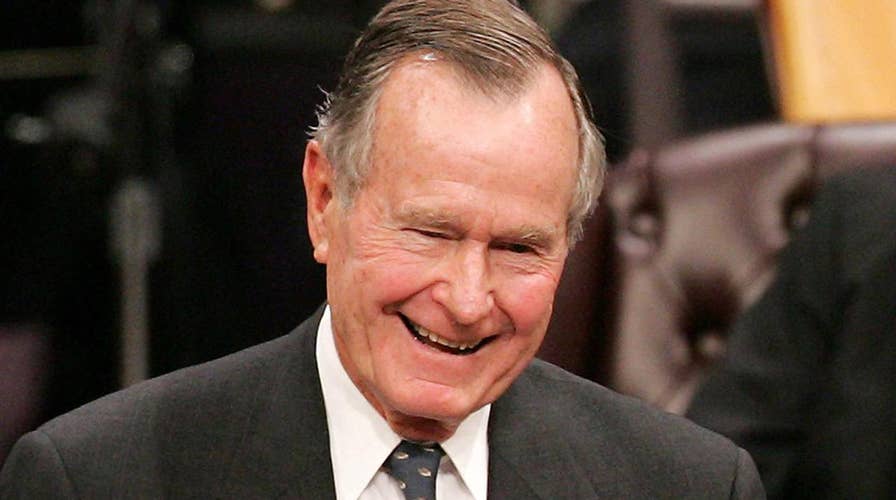The life and times of George H.W. Bush
George Herbert Walker Bush took office in 1989 as the 41st U.S. president and served one term in the White House. The father of former President George W. Bush, he was a Naval aviator in World War II, a congressman, ambassador to the United Nations, envoy to China, CIA director and vice president for two terms under Ronald Reagan.
President George H.W. Bush loved baseball and found great joy in the game as a player, coach and fan. The president told me that at age 5 he first picked up a bat, swung it, and told himself, “Baseball has everything.” It was a judgment he never revised.
In 1990, President Bush wrote the official World Series program cover story, saying: “You never forget your first love. For me, that was and is Barbara, but a close second is baseball.”
That occurred at the same time that Bush joked: “One of my grandkids told me he wanted to be a baseball player, not a politician, because politicians never get their picture on bubblegum cards.”
The Topps Baseball Card Co. proved him wrong, printing 100 cards with a picture of Bush, age 24, in his 1948 college baseball uniform playing for Yale.
From 1989 to 1993 in the White House, then later after both of us had left, I was privileged to write speeches for President Bush, who lived to be 94 and was America’s oldest and among our most beloved former U.S. presidents. Even to the cynical craft of politics, he brought an unjaded heart.
Many saw that heart in President Bush’s personal diplomacy, kindness and in manners that Miss Manners would envy. I also saw it in his lifelong love of baseball.
George Bush was raised in a family that taught loyalty and honesty – character – based upon “family, faith, and friends.” Mother Dorothy taught modesty, once referencing a grand hymn to chasten him for bragging: “Now, George, none of this ‘How Great Thou Art’ business.”Bush – nicknamed “Poppy” after his grandfather’s “Pop” – said his three years in the Navy shaped him more than any other time. Baseball played a role in shaping him as well.
The future president was 17 when the Japanese attacked Pearl Harbor on Dec. 7, 1941, thrusting America into World War II. On the day he turned 18 he enlisted in the Navy, and during training met the great Boston Red Sox left fielder Ted Williams.
The Bush-Williams friendship deepened as each served our country here and abroad. Williams, nicknamed “The Kid,” showed that he wasn’t simply the greatest hitter who ever lived.
In 1988, then-Vice President Bush trailed badly in opinion polls in the New Hampshire Republican presidential primary, barely a week away. Having lost the Iowa caucus, the Massachusetts-born Bush would likely withdraw if he lost in New Hampshire as well.
Unannounced and unknown to Bush, Williams arrived to join him on the stump. For the next two days, arguably the most recognizable person in New England and the future 41st president both barnstormed New Hampshire, with Bush joking that “I feel like hired help.”
Huge crowds greeted Bush and Williams. Bush’s victory in the New Hampshire primary over Sen. Bob Dole, R-Kan., led to Bush’s winning the GOP presidential nomination and then his election as president.
Inaugurated in January 1989, President Bush told his speechwriters, “I’d rather quote Yogi Berra than Thomas Jefferson.” That July he addressed a South Lawn crowd to start a trip to Europe to, among other things, launch Little League in Poland.
“Now I want to consult this handy-size book of statistics,” he said, “and read a couple of lines on both Stan (Musial) and Yaz (Carl Yastrzemski),” each of Polish descent. “Wanna’ know about Yaz? You gotta’ have this book!” He did – “The Encyclopedia of Baseball.”
In 1991, Bush gave Williams and Joe DiMaggio the “President’s Award,” never presented before or since, to honor their magical performance in 1941 – Ted’s .406 average and DiMag’s 56-game hitting streak.
President Bush then took Williams and DiMaggio to that night’s All-Star Game in Toronto, where a “foreign policy summit” with Canadian Prime Minister Brian Mulroney had conveniently been scheduled.
“The whole plan,” Bush said of their flight, “was to get The Kid and Joe aboard Air Force One and just listen to their stories.”
In 1945, the Greatest Generation returned from World War II. Bush wed his beloved Barbara, enrolled at Yale and captained its baseball team. A photo shows Babe Ruth, dying of throat cancer in 1948, giving Bush the manuscript of his memoir for the Yale Library.
Bush soon moved to Texas, where his four sons played ball.
“I coached it,” the future president said. “And there were tens of thousands of kids in Little League. I think that Barbara car-pooled ’em all.”
Son George W. later ran the Texas Rangers before trying politics and becoming governor of Texas and then president. In 1989, the senior Bush told journalists, “I’d rather watch baseball more than anything else.”
“What about your good field-no hit” reputation as a player, a sportswriter asked.
“Now wait a minute!” Bush protested. “Is this an assault by the press?” The reporters began laughing at Bush’s impromptu wit, easily his most unreported trait as president.
In 2017 I watched from my home in New York as Bush helped toss the ceremonial first pitch before epochal Game Five of the World Series in Houston: his hometown Astros beat the Los Angeles Dodgers 13-12, ultimately taking their first big-league title.
For George H.W. Bush, the world had changed almost beyond recognition. What had not was his love affair with baseball that began when he was only 5. That, and a wonderful man’s unjaded heart.









































